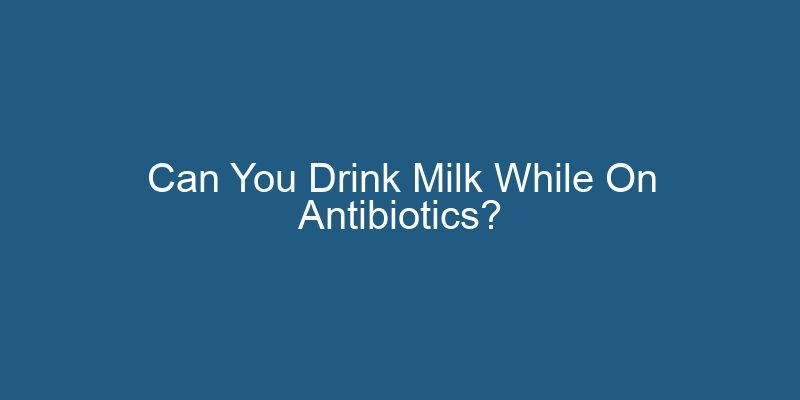When you’re prescribed antibiotics, it’s common to wonder whether you can continue consuming certain foods and beverages. One common question that arises is whether it’s safe to drink milk while taking antibiotics. In this article, we’ll explore this topic in detail, addressing various subtopics to provide you with a comprehensive understanding of the subject.
- 1. Understanding Antibiotics
- 1.1 Types of Antibiotics
- 2. Milk and Antibiotics Interaction
- 2.1 Calcium and Antibiotics
- 2.2 Tetracycline and Dairy Products
- Can I Take Antibiotics With Milk?
- Amoxicillin with milk, is it ok with dairy products
- 3. Antibiotics and Dairy Product Recommendations
- 3.1 Separate Consumption
- 3.2 Choose Non-dairy Alternatives
- 3.3 Consult Your Healthcare Professional
- 4. Frequently Asked Questions
- FAQ 1: Can I drink milk while taking amoxicillin?
- FAQ 2: Can I consume yogurt while on antibiotics?
- FAQ 3: Does milk reduce the effectiveness of antibiotics?
- FAQ 4: Can I drink milk while taking azithromycin?
- FAQ 5: Can I consume cheese while on antibiotics?
- FAQ 6: Can I drink milk while taking doxycycline?
- FAQ 7: Are there any antibiotics that can be taken with milk?
- 5. Conclusion
1. Understanding Antibiotics
Before we delve into the impact of antibiotics on milk consumption, let’s first understand what antibiotics are. Antibiotics are medications that help fight bacterial infections by killing or inhibiting the growth of bacteria. They are commonly prescribed by healthcare professionals to treat a wide range of bacterial illnesses.
1.1 Types of Antibiotics
There are several types of antibiotics available, including:
- Penicillins: These antibiotics are commonly prescribed for various infections, including respiratory and urinary tract infections.
- Cephalosporins: This group of antibiotics is used to treat a wide range of bacterial infections.
- Tetracyclines: Tetracyclines are often prescribed for skin infections, acne, and respiratory tract infections.
- Macrolides: Macrolides are commonly used to treat respiratory and skin infections.
- Fluoroquinolones: These antibiotics are effective against various bacterial infections, including urinary tract and respiratory infections.
2. Milk and Antibiotics Interaction
Now that we have a basic understanding of antibiotics, let’s explore the interaction between milk and antibiotics.
2.1 Calcium and Antibiotics
Milk is a rich source of calcium, which can potentially interfere with the absorption of certain antibiotics. Calcium can bind to some antibiotics in the gastrointestinal tract, reducing their absorption into the bloodstream. This interference can affect the effectiveness of the antibiotics in treating bacterial infections.
2.2 Tetracycline and Dairy Products
Tetracycline, a commonly prescribed antibiotic, is particularly affected by dairy products. Calcium-rich foods, including milk, can form insoluble complexes with tetracycline in the stomach, preventing its absorption. It is recommended to avoid consuming dairy products, especially milk, within two hours of taking tetracycline to ensure optimal absorption.
Can I Take Antibiotics With Milk?
Amoxicillin with milk, is it ok with dairy products
3. Antibiotics and Dairy Product Recommendations
Considering the potential interaction between antibiotics and dairy products, including milk, it is advisable to follow these recommendations:
3.1 Separate Consumption
To minimize the interaction between antibiotics and milk, it is best to separate their consumption. It is recommended to take antibiotics at least two hours before or after consuming milk or any other calcium-rich dairy products.
3.2 Choose Non-dairy Alternatives
If you are concerned about the potential interaction between antibiotics and milk, you can consider opting for non-dairy alternatives. There are various plant-based milk alternatives, such as almond milk, soy milk, or rice milk, that do not contain calcium and are not likely to interfere with antibiotic absorption.
3.3 Consult Your Healthcare Professional
It is important to consult your healthcare professional regarding any dietary restrictions or guidelines while taking antibiotics. They can provide personalized advice based on the specific antibiotic prescribed and your individual health status.
4. Frequently Asked Questions
FAQ 1: Can I drink milk while taking amoxicillin?
Answer: Amoxicillin, a type of penicillin antibiotic, is not significantly affected by milk consumption. However, to ensure optimal absorption, it is recommended to take amoxicillin on an empty stomach or at least two hours before or after consuming milk.
FAQ 2: Can I consume yogurt while on antibiotics?
Answer: Yogurt contains live bacteria cultures, known as probiotics, which can be beneficial during and after a course of antibiotics. However, it is advisable to separate the consumption of yogurt and antibiotics by at least two hours to avoid any potential interaction.
FAQ 3: Does milk reduce the effectiveness of antibiotics?
Answer: Milk, particularly calcium-rich dairy products, can potentially reduce the absorption of certain antibiotics, thereby affecting their effectiveness. It is advisable to separate the consumption of milk and antibiotics to ensure optimal absorption.
FAQ 4: Can I drink milk while taking azithromycin?
Answer: Azithromycin, a macrolide antibiotic, is not significantly affected by milk consumption. However, it is recommended to follow the general guideline of separating the consumption of milk and antibiotics by at least two hours to avoid any potential interaction.
FAQ 5: Can I consume cheese while on antibiotics?
Answer: Cheese, like milk, is a dairy product that contains calcium. Therefore, it is advisable to separate the consumption of cheese and antibiotics by at least two hours to minimize any potential interaction.
FAQ 6: Can I drink milk while taking doxycycline?
Answer: Doxycycline, a type of tetracycline antibiotic, is particularly affected by milk consumption. It is recommended to avoid consuming milk or other dairy products within two hours of taking doxycycline to ensure optimal absorption.
FAQ 7: Are there any antibiotics that can be taken with milk?
Answer: While it is generally recommended to separate the consumption of milk and antibiotics, there are certain antibiotics, such as fluoroquinolones, that are less likely to be affected by milk consumption. However, it is always best to consult your healthcare professional for personalized advice.
5. Conclusion
While it is generally advisable to separate the consumption of milk and antibiotics to ensure optimal absorption, the impact may vary depending on the specific antibiotic prescribed. Understanding the potential interaction and following the recommendations provided can help you make informed choices while on antibiotics. Remember to consult your healthcare professional for personalized advice based on your individual circumstances.










